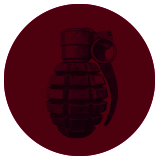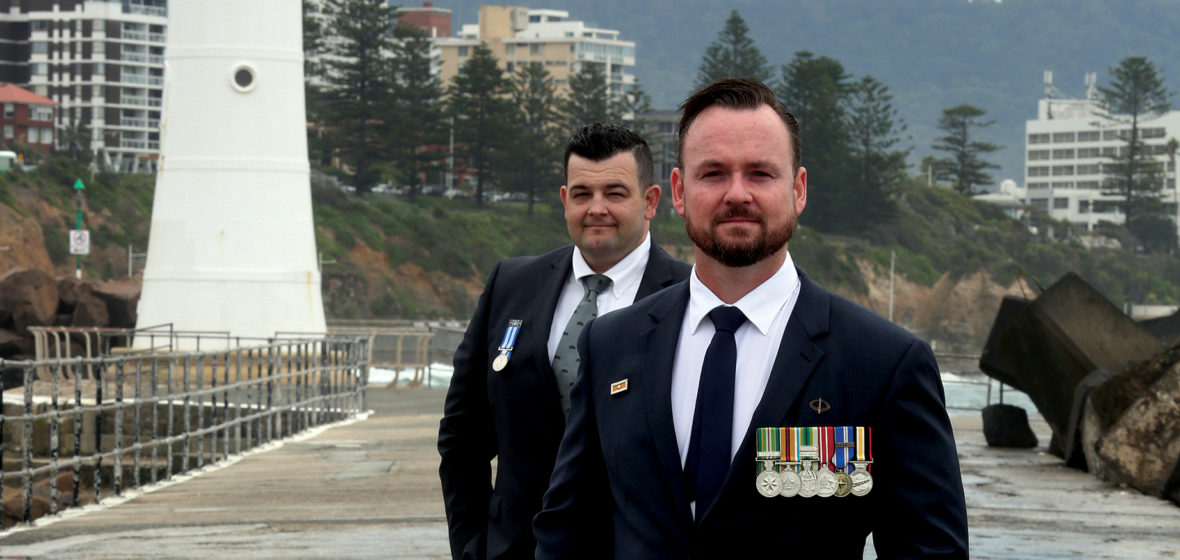“If there are crimes to answer to, we are potentially prejudicing the case and damaging chances for the criminal justice system to do its job. There are a lot of people giving opinions who really aren’t qualified to. I think, in general, the legal fraternity would be pretty shocked by a lot of the commentary on the report.”
The Brereton Report sent shockwaves around Australia when it was released in redacted form in November 2020. Phrases like “warrior culture”, “moral reckoning” and, the words of the Inspector-General of the Australian Defence Force, “possibly the most disgraceful episode in Australia’s military history” peppered the news cycle.
What many veterans consider a trial by media has wreaked havoc on soldiers’ mental health. For lawyers watching, the potential for criminal trials presents a legal minefield.
For most of his adult life, Australian former Green Beret Commando Mick Bainbridge didn’t think he would live to see his 31st birthday.
He joined the Army at 18 and survived five deployments with the Special Forces, including four harrowing tours to Afghanistan, during a 14-year career with the elite 2nd Commando Regiment. Each time he went out on patrol, Bainbridge and his comrades would pen a “dead letter” to their loved ones, which was kept safe by superior officers in case they didn’t return. Hoisting his own body bag into a patrol vehicle before heading into a gunfight became as normal as making his bed each morning.
“Throughout my 20s I had accepted in my mind that I’d be dead by 30. I never planned past that,” he tells LSJ. “It was like Sydney after the Olympics – nobody knew what to do.”
Bainbridge witnessed violence, explosions, bloodshed, and some of his best mates’ last breaths in Afghanistan. As depicted in a 2018 episode of ABC’s Australian Story, he has been haunted by post-traumatic stress disorder (PTSD) since attempting to rescue mates from the wreckage of a Black Hawk helicopter crash in 2010 that killed three of his comrades.
Ongoing physical and mental health struggles and his family separation are part of the collateral fallout from Bainbridge’s service years. He is recovering from a major surgery on his spine – the legacy of an old war wound – that he underwent a week before photos for this story were taken. It’s partly why he has been so devastated by public commentary, involving some cruel assumptions, surrounding the Brereton Report.
“I’ve always been proud of my service. But I fear that the manner in which these findings have been made public will create another Vietnam-style response for our veterans,” he tells LSJ.
“I know blokes who have given their lives to Afghanistan and their kids are being called war criminals in the schoolyard.”
Is due process being served?
The Brereton Report was commissioned by the Inspector-General of the Australian Defence Force (IGDAF) in 2016 and published in November 2020, detailing allegations of war crimes involving at least 25 current or former Australian Special Forces personnel in Afghanistan. It is the result of a four-year inquiry into rumours of a toxic culture among Australian Special Forces troops in Afghanistan led by Paul Brereton, a Justice of the NSW Court of Appeal and Major General in the Australian Army Reserves.
Justice Brereton found “credible information” to substantiate evidence of execution-style slaughters of civilians and prisoners, and situations where junior soldiers were coerced to execute prisoners to achieve their first kill in a practice known as “blooding”. The report itself is shocking. But what has perhaps hurt veterans like Bainbridge most has been its public release (in redacted form), enabling vitriolic media commentary and early judgments to be cast by the Australian public.
“The way this has been approached is going to influence prosecutions, investigations, it’s going to have ongoing effects for servicemen and women and their families,” says Bainbridge.
Bainbridge has a unique perspective on the report’s impacts, having served in the Army for 14 years before being medically discharged for war service injuries. His transition to law was supported by the Department of Veterans’ Affairs (DVA).
After receiving his discharge for a broken back in 2016 (DVA refused to acknowledge his PTSD at the time), Bainbridge became a lawyer working for veterans who need legal assistance in a range of areas when transitioning back to civilian life. It requires a knowledge of a huge spectrum of law: negligence, family, employment, and even criminal law issues come up. He set up a veteran-owned and operated practice in 2019 in Wollongong called Operational Legal Australia (OLA) with partner and fellow Army veteran, lawyer and serving NSW Police Sergeant Paul James. Five lawyers now make up the team.
LSJ meets with Bainbridge and James a few weeks after the public release of a redacted version of the report. Solicitor Glenn Kolomeitz, a former Army legal officer who served alongside Bainbridge in Afghanistan and consults to OLA as Special Counsel, joins us. The veterans are grateful for an opportunity to share their views on what they see as a lack of due process afforded to the soldiers implicated.
“We have no doubt in the veracity of Justice Brereton’s report,” says Kolomeitz, whose duty in Afghanistan included advising Army personnel on the legalities of operations, like targeted drone strikes. International humanitarian law, which is governed by the Rome Statute and recognised in Australia’s Commonwealth criminal law, prohibits military forces from targeting civilians or prisoners.
“We are not questioning the report, and we are 100 per cent behind getting rid of any toxic culture that is found to exist in our Special Forces. It’s the way they have released the report into the public domain – it’s abhorrent.
And the way the Chief of the Defence Force has made some knee-jerk statements about it.”
On the day of the report’s public release in November, the Australian Chief of Defence Angus Campbell issued a “sincere and unreserved” apology to the Afghanistan people. It was a speech that appeared to cement the guilt of his soldiers, while exculpating himself and fellow senior commanders.

One of several controversial sections was Campbell’s pledge that he would write to the Australian Governor-General asking for the Special Forces’ Meritorious Unit Citation – a group award recognising outstanding service that Bainbridge is pictured (previous page) wearing above his right breast – to be revoked. It was an early call that drew criticism from the veteran community and prompted Prime Minister Scott Morrison to distance himself from Campbell’s comments.
Campbell, though, had been under public pressure to release Justice Brereton’s findings. Parliamentary records show that media reports surfaced as early as 2007 alleging misconduct by Australian troops in Afghanistan. Calls for transparency and accountability grew louder when the ABC published the notorious Afghan Files series in 2017, and when ABC’s Four Corners showed bodycam footage of an Australian SAS soldier shooting an unarmed man at close range in March 2020. In November 2020, the Human Rights Law Centre alongside 20 Afghan, Australian and international human rights and legal organisations wrote to the IGDAF, urging him to commit to releasing the findings to the public.
“The public interest requires release,” wrote Rawan Arraf, Principal Lawyer and Director at the Australian Centre for International Justice. “A summary of the report is not enough. The Australian people deserve to know what was done in our name, and to be engaged in a process of ensuring those responsible are held to account.”
Defence Chief Campbell said releasing the report to the public “marks an important but difficult step forward for the Australian Defence Force and our people”. But Bainbridge believes it could be prejudicial for the soldiers involved.
“In other aspects of civilian life, we have separation of powers and government,” Bainbridge says. “Why is the executive [the IGADF, a statutory office holder appointed by the Minister for Defence] coming out and saying that, ‘This is murder’ or ‘This is a war crime’? They would never do that to civilians in another circumstance.”
“Yes, they’ve redacted people’s names. But it is still quite easy to work out who is involved,” adds James. “It will be difficult to empanel a jury with 12 people off the street who don’t have opinions on the matter. It is also a national security issue for Australia, due to the sensitive and secret details the jury may hear.”
“If there are crimes to answer to, we are potentially prejudicing the case and damaging chances for the criminal justice system to do its job,” Bainbridge continues. “There are a lot of people giving opinions who really aren’t qualified to. I think, in general, the legal fraternity would be pretty shocked by a lot of the commentary on the report.”
A long road to justice
In December 2020, the federal government set up a new Office of the Special Investigator to examine the findings of the Brereton Report and begin collecting evidence for potential criminal prosecutions. The special investigator is Victorian Court of Appeal judge Mark Weinberg and he has been tasked with referring any alleged war criminals to federal prosecutors, to charge them in Australia’s civilian courts with murder if appropriate.
So, Brereton’s four-year investigation has led to another long investigation. Members of the Australian public might query why we need it.
“It’s called the fruit of the poisonous tree. If evidence is derived from a coercive inquiry, such as the Brereton Inquiry, it can’t be used in a criminal prosecution,” explains Kolomeitz.
“In a coercive inquiry, witnesses are compelled to give evidence and compelled to answer questions, like a royal commission. But those responses can’t be used against you in a criminal proceeding because in criminal court, the accused has a right to silence.”
Military law researcher and PhD candidate at UNSW Sam Hartridge believes the criminal investigation could take at least another four years. Securing any guilty convictions could present a mammoth task for prosecutors.
“Beyond reasonable doubt is always a high standard to meet,” says Hartridge, who was a digger in the Australian Army for five years before he went to law school.
“There are difficulties regarding the crimes being committed some time ago, in another country. It’s difficult to get reliable witness evidence, it’s difficult to get contextual evidence. The fact that the soldiers were in combat operations complicates things, and there may be reasons for diminished capacity such as PTSD or prolonged combat fatigue.”
The lack of precedent may be another problem. There have not been any successful prosecutions of Australian soldiers of crimes committed in battle by our courts in recent history. The only case to come close, Re Civilian Casualty Court Martial (2011), involved an incident in which Australian soldiers threw hand grenades into a house in Afghanistan, killing civilian women and children. It fell over at preliminary stages because it was going to be too difficult to prove the civilians were intentionally targeted, and that the soldiers had the criminal mens rea required for murder or manslaughter.
With so many obstacles to overcome before a conviction, some veterans say releasing the Brereton Report to the public was premature. But Hartridge believes it was a necessary part of the transparency process.
“The criminal defence lawyer in me understands the argument of due process, but the human rights lawyer in me sees the merit in demonstrating accountability,” Hartridge says. “I think it’s necessary to show transparency. There’s the old cliché – justice not only has to be done but has to be seen to be done.”
The damage that has already been done
Heston Russell is a retired Special Forces Major and the founder of Voice of a Veteran, a platform that advocates for veterans and wants to reduce the high numbers of veteran suicides in Australia. He launched a petition in November for SAS soldiers to keep their medals after Campbell’s comments. It has received 85,000 signatures at the time of writing in mid-February.
“Until I began my campaign and we began getting members of the public to see our side, there was a real risk of this becoming a second Vietnam,” says Russell. He believes the comments by Campbell and some media surrounding Australia’s involvement in Afghanistan and the Brereton Report has done irreversible damage to veterans’ mental health.
“My stomach bottoms out when I think about it. The damage is huge,” he says. “These people are already suffering from a loss of identity. Now they are being asked by their family or friends, ‘Did you kill anyone? Did you see it?’ One of my soldiers, his six-year-old daughter saw the SAS being called murderers on the news and she was like, ‘Daddy, are you a murderer?’
“I see my own people, my own Australians being bullied. To the extent they are losing themselves and their families.”

At least 419 veterans committed suicide between 2001 and 2017, according to official data from the Australian Institute of Health and Welfare. Advocates such as Senator Jacquie Lambie, who has repeatedly called for a royal commission into veteran suicides, estimate the numbers higher, at around 600. The ABC reports at least nine have taken their own lives in October and November, in the weeks surrounding the release of the Brereton Report.
Stephanie Hodson, National Manager of Open Arms, the national free counselling service for veterans and their families, tells LSJ that Open Arms saw a 50 per cent rise in calls to its 24-hour hotline in 2020. That could be due to a range of things – including a considered push by Open Arms to encourage veterans to reach out after the uncertainty of the COVID-19 pandemic and bushfires during the first half of the year.
“We’ve been really proactive this year with getting the message out there in the community for veterans to call Open Arms when they’re struggling. But the Brereton Report did cause distress, there’s no two ways about it,” she says.
“About 39,000 people went to Afghanistan and the Brereton Report rippled through the community. Veterans sacrifice family time, they miss life events and they really believe in their service. When something like that comes out, it makes everyone question their service even if they have done nothing wrong.
“The message we want to get out there is, don’t wait until you’re in crisis, call us for support.”
Bainbridge and James echo Hodson’s call, but from a legal perspective: call a lawyer with experience in veterans’ issues before heading into any battles at home.
Spectators need to hold fire
With the Brereton Report already out in the public eye, what Bainbridge wants to see moving forwards is a fair and diligent investigation, careful media reporting and – above all – empathy for his comrades.
“Our Special Forces do a really difficult, arduous, life-threatening job,” he says. “Some of them have seen more combat than our World War One and Two diggers did. They went back and back and back, over and over again, over a 10- or 15-year period.
“If someone has breached the rules of engagement, they should have to answer for it. I have always stood by that. But I don’t think the rest of us can play judge, jury, and executioner all in one. Commentators need to understand that the best way for the system to work is to allow it to work without trying to influence it.”
If this story raised issues for you
Open Arms provides 24-hour free and confidential counselling for current and former ADF members and their families 1800 011 046
The Law Society of NSW’s Solicitor Outreach Service (SOS) offers free, confidential support for solicitors in NSW 1800 592 296
If your life (or someone else’s life) is in immediate danger – call 000




